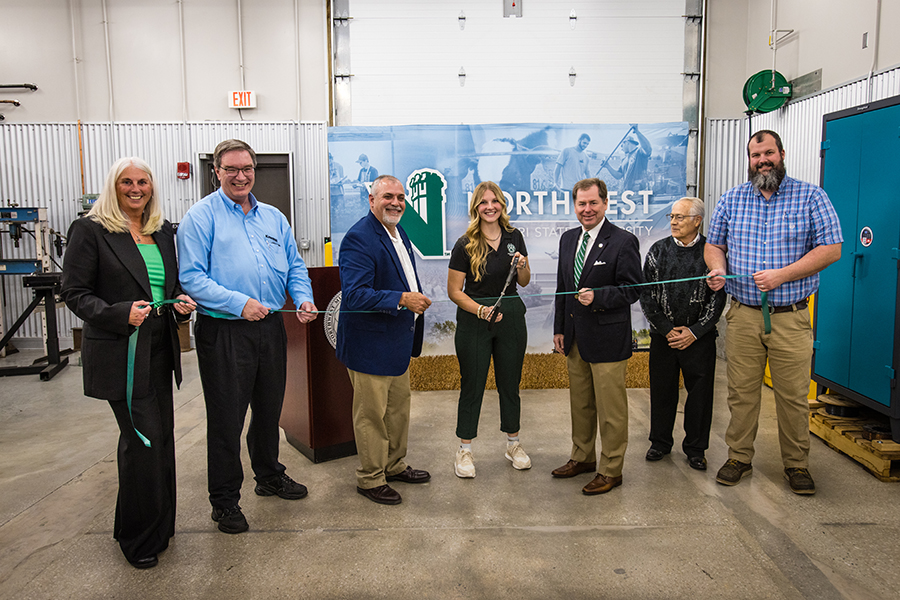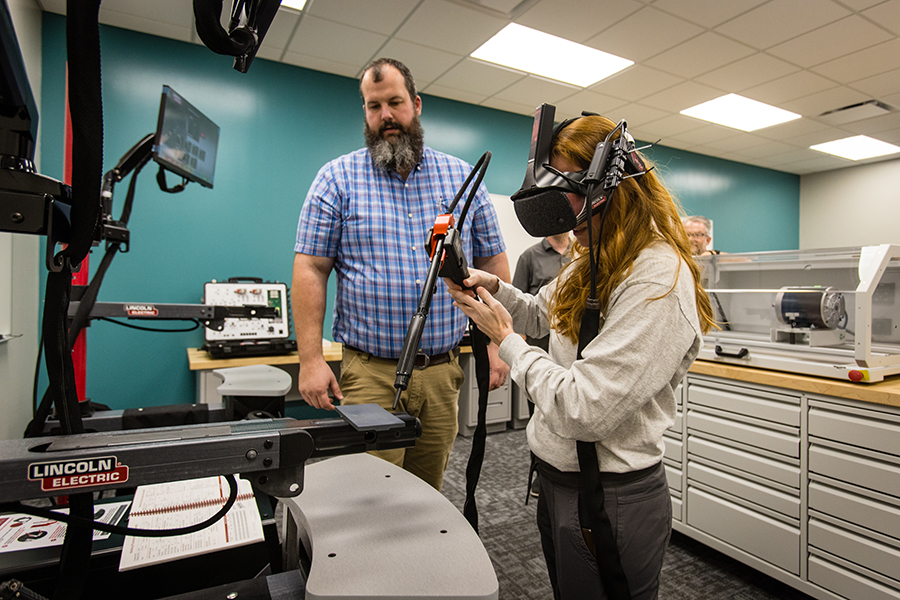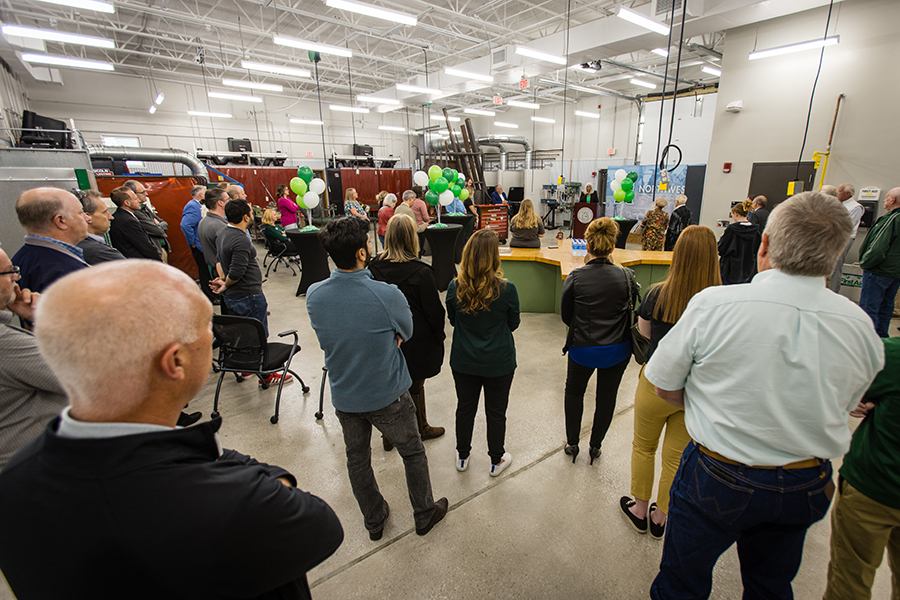The Northwest Missouri State University community gathered Wednesday for a ribbon-cutting to celebrate the completion of a renovation that is enabling the University to develop programming related to systems management for manufacturing and agribusiness.
The renovation of Northwest’s McKemy Center for Lifelong Learning, which was completed during the summer, now provides laboratory space, safety and infrastructure upgrades and welding booths.
The facility features Power Wave C300 portable multi-process wire feeder welders with high-end functionality capable of Stick, DC TIG, MIG, Pulsed MIG and Flux-Cored welding. It also is equipped with a VRTEX virtual reality welding training simulator that promotes the transfer of welding skills and body positioning while reducing waste associated with traditional welding training.
The McKemy Center, University leaders said, is now an important player in developing a workforce for the 21st century.
“This project is going to add so much to this university,” Northwest Provost Dr. Jamie Hooyman said. “It helps us focus on what’s important, which is our student learning. It’s going to allow us to adapt our curriculum and our academic programs. It’s going to allow us to expand our student learning. It’s also going to allow our students to have profession-based learning experiences in a safe environment where they can try things with instruction.”

The Northwest community gathered Wednesday to celebrate the completion of its renovation of the McKemy Center with a ribbon-cutting ceremony. Pictured left to right are Northwest Provost Dr. Jamie Hooyman; Tim Melvin, production manager for assembly materials at Kawasaki Motors Manufacturing Corporation; Dr. Rod Barr, director of Northwest's School of Agricultural Sciences; Northwest student Meghan Hunerdosse; Northwest President Dr. Lance Tatum; Dr. Marvin Hoskey, a retired Northwest assistant professor of agriculture; and Matt Bax, a Northwest instructor of agricultural Sciences. (Photos by Lauren Adams/Northwest Missouri State University)
Core agricultural mechanics competencies have been taught at Northwest for decades. In fact, the McKemy Center opened in 1977 as the Agricultural Mechanics Building before it underwent multiple remodels to serve other purposes. Since the mid-1990s, the building had served as a home for interactive television programming, a mathematics lab and the Regional Professional Development Center, among other uses.
The most recent renovation at the McKemy Center, however, is returning the building to its original purpose and helping the University and its School of Agricultural Sciences focus on systems management while addressing labor needs in the agriculture and manufacturing industries.
“This was home for me 40 years ago as a freshman at the university,” Dr. Rod Barr, a Northwest alumnus who now leads the School of Agricultural Sciences, said. “I spent a lot of time in this facility, and it really set the stage for my success as a high school agricultural educator and now as the director of the School of Agricultural Sciences.”

Matt Bax, an instructor of agricultural Sciences, assists a student who is using a welding simulator in the remodeled McKemy Center.

The McKemy Center for Lifelong Learning now provides laboratory space, safety and infrastructure upgrades and welding booths.
Beginning with the fall, the University is offering coursework related to welding, precision measuring, electronics and electricity, mechatronics, personal protective equipment and safety, robotics and other industry-standard certifications. Additionally, Northwest plans to implement a Systems Management Academy for high school students and teachers.
By offering comprehensive systems management training and skill development, as well as certifying those skills with industry-recognized stackable credentials, Northwest will help increase the labor force for manufacturing and agribusiness industry clusters.
To help students learn the skills they need to earn certifications, Northwest faculty, including Matt Bax, an instructor of agricultural Sciences, are completing training programs of their own through the National Coalition of Certification Centers and learning from industry experts.
“The end goal is that the students earning these certifications take that information to whatever school district or industry that they go into and then teach others the same skill,” Bax said.
Meghan Hunerdosse, a junior agricultural education major from Indianola, Iowa, is enrolled this fall in Northwest’s ag mechanics course and already realizing the skills she is learning now will benefit students she will teach in the future.
“I’m really excited about this new space and everything that we’ve been getting to learn,” Hunerdosse said, adding that opportunities to practice on equipment such as the welding simulator have helped her grow more confident in her skills. “I have loved that they are realistic and help students adapt themselves to what welding actually feels like. One of my favorite features is that they grade you at the end and let you know what you can do to improve.”
The ribbon-cutting also recognized the donors who provided funding support for the renovation project. Northwest received grant funding from the Missouri Department of Economic Development in addition to support from the CHS Foundation, the Missouri Department of Higher Education and Workforce Development, Don and Jody Athen, and Kawasaki Motors Manufacturing Corporation.
Tim Melvin, the production manager for assembly materials at Kawasaki, praised Northwest for its vision and determination to turn the project into a reality.
“The passion and dedication to Northwest Missouri State University for the preparation of highly skilled, properly trained industry-ready individuals is evident throughout this building,” Melvin said. “Kawasaki is proud to partner with Northwest and so many others with this endeavor. Kawasaki remains eager to reap the benefits of this program with highly trained individuals entering the labor force. Kawasaki is also eager to assist in the development of potential coursework and programs for continued skills, certification, opportunities for current manufacturing team members for the enhancement of their training, their abilities and their competencies.”